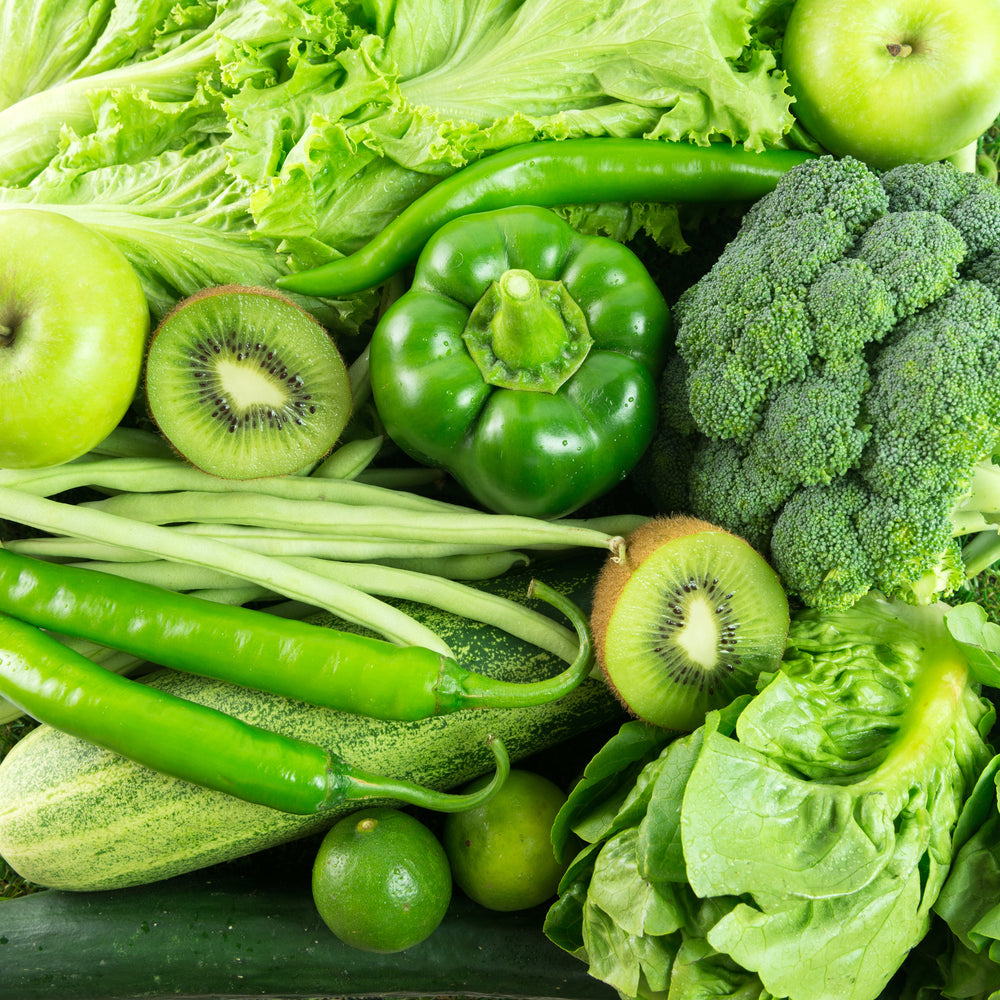Greens Powder: Are there Health Benefits?
Greens powder is a popular dietary supplement designed to help individuals meet their daily vitamin and mineral intake. Formulated from a variety of ingredients—such as leafy greens, seaweed, grasses, antioxidant-rich fruits, probiotics, and herbs—these powders aim to support the immune system and enhance energy levels. Typically consumed by mixing with water, smoothies, or juices, greens powders often contain natural sweeteners like stevia to improve their taste and are usually vegan and organic.
Nutrition Information
The nutritional content can vary by brand, but an average serving (one tablespoon) typically contains around 45 calories, 3 grams of protein, and significant amounts of vitamins and minerals, including 60% of the daily value for Vitamin A and 18% for iron. They may also provide calcium, iodine, selenium, chromium, and potassium, along with high levels of vitamin C, which supports immune function and skin health.
Potential Health Benefits
While greens powders cannot replace whole foods or their fiber content, they can serve as an effective supplement to a balanced diet. Potential health benefits include:
- Healthy Blood Pressure: Minerals like calcium and potassium may help manage blood pressure.
- Immune System Support: High levels of vitamins A and selenium enhance immune function.
- Chronic Disease Prevention: Antioxidants in greens powders may reduce the risk of diseases linked to oxidative stress, such as diabetes and heart disease.
- Eye and Cognitive Health: Vitamin K contributes to maintaining blood vessel health and may support eye health and cognitive function.
Potential Risks
Despite their benefits, greens powders come with potential risks, including:
- Medication Interactions: Vitamin K can interact with medications like blood thinners and antibiotics, necessitating caution for those on such treatments.
- Contaminants: Some greens powders may contain heavy metals like lead, which can be harmful in high amounts.
- Allergies: Ingredients like green tea extract or wheatgrass may trigger allergic reactions in some individuals.
- Pregnancy and Breastfeeding Concerns: The safety of certain herbal supplements in greens powders during pregnancy or breastfeeding is not well established.
Green vs. Greens Powder
While both green foods and greens powders provide valuable nutrients, there are key differences:
- Nutritional Content: Green foods like kale, spinach, and broccoli are rich in fiber, vitamins, and minerals, while greens powders often have concentrated amounts of certain nutrients but lack the fiber found in whole foods.
- Digestive Health: Whole green foods contribute to digestive health through their fiber content, aiding in regularity and satiety. Greens powders may not provide the same benefits due to their low fiber content.
- Bioavailability: The body may absorb nutrients from whole foods more effectively than from powdered forms. Whole foods also contain a variety of phytonutrients that work synergistically for optimal health.
- Convenience: Greens powders can be a convenient option for those who struggle to consume enough vegetables daily, especially for people with busy lifestyles.
Eat Green?
In 2003, a couple dreamed of becoming homesteaders, aspiring to grow their own food and live sustainably. Now, 20 years later, while they haven’t fully realized that dream, they have adapted to a busy life with a daughter involved in sports and full-time jobs. They focus on manageable, sustainable practices to reduce their environmental impact.
Key Sustainable Practices
- Eat More Plant-Based Meals: They prioritize plant-based diets, which are healthier for both individuals and the planet. They enjoy meals like falafel, lentil soups, and cauliflower tacos.
- Reap Health Benefits of Green Produce: Emphasizing the health benefits of dark leafy greens, they incorporate more vegetables into their diet, promoting better digestion and overall wellness.
- Get Into Gardening: Their home garden provides fresh produce, fostering a connection to their food. They encourage small-scale gardening for those with limited space, recommending container gardening for herbs and vegetables.
- Use Up Food Before It Goes Bad: To minimize food waste, they create versatile dishes like soups and frittatas using leftovers, ensuring nothing goes to waste.
- Compost Food Scraps: Although they currently use a local composting facility, they plan to resume home composting to enrich their garden soil and reduce organic waste.
- Embrace Reusable Containers: They use reusable produce bags and containers to reduce plastic waste, supporting bulk shopping and sustainable practices.
- Prioritize Sustainable Meat & Seafood Sources: When purchasing meat, they opt for local, grass-fed options and sustainable seafood, informed by resources like the Monterey Bay Aquarium’s Seafood Watch.
While their homesteading dreams remain on hold, the couple finds joy in gardening and sustainable practices, hoping that their efforts inspire others to adopt green habits.
The Power of Green Foods
Green foods are essential for a healthy diet and can be easily incorporated into meals. Popular options include:
- Spinach
- Kale
- Collard Greens
- Bok Choy
- Cabbage
- Broccoli
- Green Peas
- Zucchini
- Asparagus
- Green Beans
Consuming a variety of these foods can provide numerous health benefits:
- Rich in Antioxidants: Green foods like spinach and broccoli are high in antioxidants (vitamins A, C, and E), which help protect the body from viruses. Eating at least three servings daily ensures sufficient antioxidant intake.
- Low in Calories: Dark leafy greens are water-rich and low in calories, allowing for generous portions without weight gain. They can enhance the nutritional value of dishes like enchiladas, soups, and pastas while keeping calorie counts down.
- Source of Phytonutrients: These special compounds found in green foods boost the immune system and protect against cellular damage. Variety in daily consumption is key to obtaining a range of phytonutrients.
- Low in Carbohydrates: Green foods contain minimal carbohydrates, primarily in the form of complex carbs rich in fiber. This fiber aids in satiety and promotes digestive health by helping to eliminate pollutants from the body.
- Regulate Blood Sugar Levels: Unlike many processed foods, green foods are low in sugars and high in fiber and water, helping to stabilize blood sugar levels and reduce the risk of diabetes.
Conclusion
In conclusion, the journey toward a healthier, more sustainable lifestyle can take many forms, as illustrated by the exploration of greens powders, personal sustainability practices, and the significance of green foods in our diets. Greens powders serve as convenient supplements, rich in essential vitamins and minerals, offering potential health benefits while reminding us that they cannot fully replace the nutritional value of whole foods.
Meanwhile, the couple’s commitment to manageable, eco-friendly habits—ranging from plant-based meals to composting—highlights that sustainability is not solely about grand gestures, but rather the accumulation of small, impactful choices. Incorporating a variety of green foods—like spinach, kale, and broccoli—into our daily meals offers a treasure trove of health benefits, from boosting immunity to regulating blood sugar.
By embracing the vibrant world of greens, both in powder form and as whole foods, we nourish our bodies while simultaneously supporting environmental health. Together, these insights inspire us to cultivate our own paths to wellness, encouraging mindful eating and sustainable living as integral parts of our modern lives.
REFERENCE
- WebMD. (n.d.). Greens powder: Are there health benefits? Retrieved October 16, 2024, from https://www.webmd.com/diet/greens-powder-are-there-health-benefits
- EatingWell. (n.d.). Eat Green: Simple Steps for a Sustainable Lifestyle. Retrieved from https://www.eatingwell.com/longform/8030315/eat-green/
- FitDay. (n.d.). The Bald-Faced Truth: Everything You Need to Know About Fighting Hair Loss. Retrieved from https://www.fitday.com/fitness-articles/fitness/the-bald-faced-truth-everything-you-need-to-know-about-fighting-hair-loss.html



